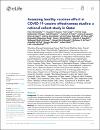Assessing healthy vaccinee effect in COVID-19 vaccine effectiveness studies: a national cohort study in Qatar.

عرض / فتح
التاريخ
2025-06-09المؤلف
Chemaitelly, HiamAyoub, Houssein H
Coyle, Peter
Tang, Patrick
Hasan, Mohammad R
Yassine, Hadi M
Al Thani, Asmaa A
Al-Kanaani, Zaina
Al-Kuwari, Einas
Jeremijenko, Andrew
Kaleeckal, Anvar Hassan
Latif, Ali Nizar
Shaik, Riyazuddin Mohammad
Abdul-Rahim, Hanan F
Nasrallah, Gheyath K
Al-Kuwari, Mohamed Ghaith
Al-Romaihi, Hamad Eid
Al-Thani, Mohamed H
Al-Khal, Abdullatif
Bertollini, Roberto
Butt, Adeel A
Abu-Raddad, Laith J
...show more authors ...show less authors
البيانات الوصفية
عرض كامل للتسجيلةالملخص
This study investigated the presence of the healthy vaccinee effect-the imbalance in health status between vaccinated and unvaccinated individuals-in two rigorously conducted COVID-19 vaccine effectiveness studies involving primary series and booster vaccinations. It also examined the temporal patterns and variability of this effect across different subpopulations by analyzing the association between COVID-19 vaccination and non-COVID-19 mortality in Qatar. Two matched, retrospective cohort studies assessed the incidence of non-COVID-19 death in national cohorts of individuals with a primary series vaccination versus no vaccination (two-dose analysis), and individuals with three-dose (booster) vaccination versus primary series vaccination (three-dose analysis), from January 5, 2021, to April 9, 2024. The adjusted hazard ratio (aHR) for non-COVID-19 death was 0.76 (95% CI: 0.64-0.90) in the two-dose analysis and 0.85 (95% CI: 0.67-1.07) in the three-dose analysis. In the first 6 months of follow-up in the two-dose analysis, the aHR was 0.35 (95% CI: 0.27-0.46); however, the combined analysis of all subsequent periods showed an aHR of 1.52 (95% CI: 1.19-1.94). In the first 6 months of follow-up in the three-dose analysis, the aHR was 0.31 (95% CI: 0.20-0.50); however, the combined analysis of all subsequent periods showed an aHR of 1.37 (95% CI: 1.02-1.85). The overall effectiveness of the primary series and third-dose vaccinations against severe, critical, or fatal COVID-19 was 95.9% (95% CI: 94.0-97.1) and 34.1% (95% CI: -46.4-76.7), respectively. Subgroup analyses showed that the healthy vaccinee effect is pronounced among those aged 50 years and older and among those more clinically vulnerable to severe COVID-19. A pronounced healthy vaccinee effect was observed during the first 6 months following vaccination, despite meticulous cohort matching. This effect may have stemmed from a lower likelihood of vaccination among seriously ill, end-of-life individuals, and less mobile elderly populations. Biomedical Research Program and the Biostatistics, Epidemiology, and Biomathematics Research Core, and Junior Faculty Transition to Independence Program, all at Weill Cornell Medicine-Qatar, Qatar University, Ministry of Public Health, Hamad Medical Corporation, Sidra Medicine, Qatar Genome Programme, Qatar University Biomedical Research Center, and L'Oréal-UNESCO For Women In Science Middle East Regional Young Talents Program. Before new vaccines are made widely available, their efficacy and safety are tested in laboratories and clinical trials. Once approved, researchers can continue to monitor how these vaccines perform in the ‘real world’ by analysing healthcare data. This can provide further insights over a longer timeframe and across a broader range of people. However, these real-world analyses can be skewed by a range of factors. For example, if healthier people are more likely to receive the vaccine, researchers may overestimate its effectiveness due to fewer deaths or severe illnesses amongst that group. This ‘healthy vaccinee effect’ has been observed in influenza vaccines among older people, for example. To determine whether the healthy vaccinee effect influenced COVID-19 vaccine studies, Chemaitelly et al. analysed national health records in Qatar. Groups of vaccinated and unvaccinated people were selected to have matching demographics, such as age, sex and number of preexisting conditions. Overall, the study confirmed strong protection from vaccination against severe forms of COVID-19. However, the results showed that, compared to their unvaccinated peers with similar characteristics, vaccinated people were 65 per cent less likely to die due to reasons unrelated to COVID-19 in the next six months after having received the vaccination. This effect was even stronger among individuals aged 50 years or older, as well as those with clinical vulnerabilities. Chemaitelly et al. suggest that this likely reflects lower vaccine uptake among seriously ill, end-of-life individuals and less mobile older populations with short life expectancy. Future work may be needed to understand if this can be generalised to countries that differ from Qatar, whose population mainly consists of healthy adult migrant workers.
المجموعات
- أبحاث مركز البحوث الحيوية الطبية [881 items ]
- العلوم الحيوية الطبية [886 items ]
- أبحاث فيروس كورونا المستجد (كوفيد-19) [924 items ]
- الرياضيات والإحصاء والفيزياء [819 items ]
- الصحة العامة [548 items ]

